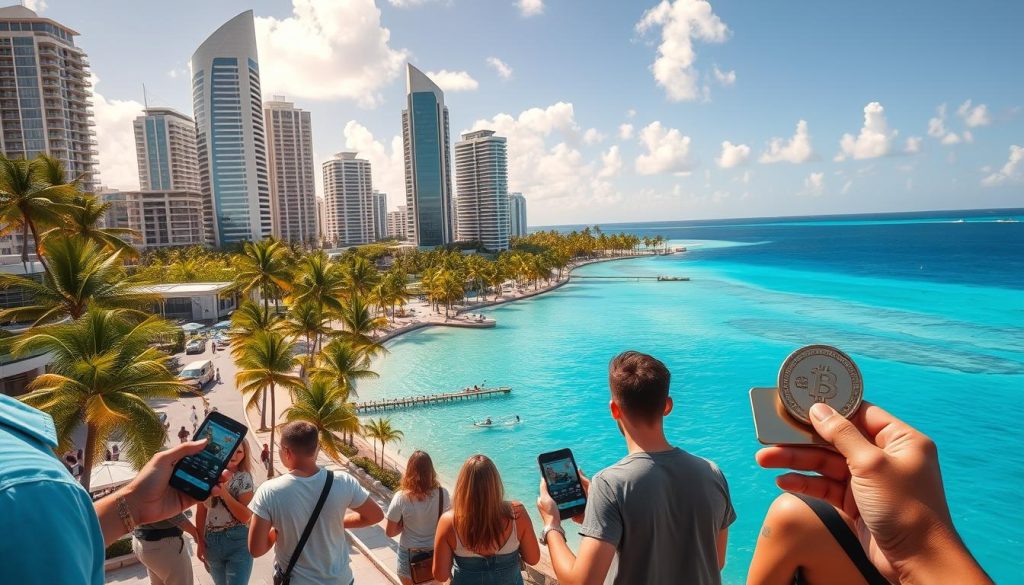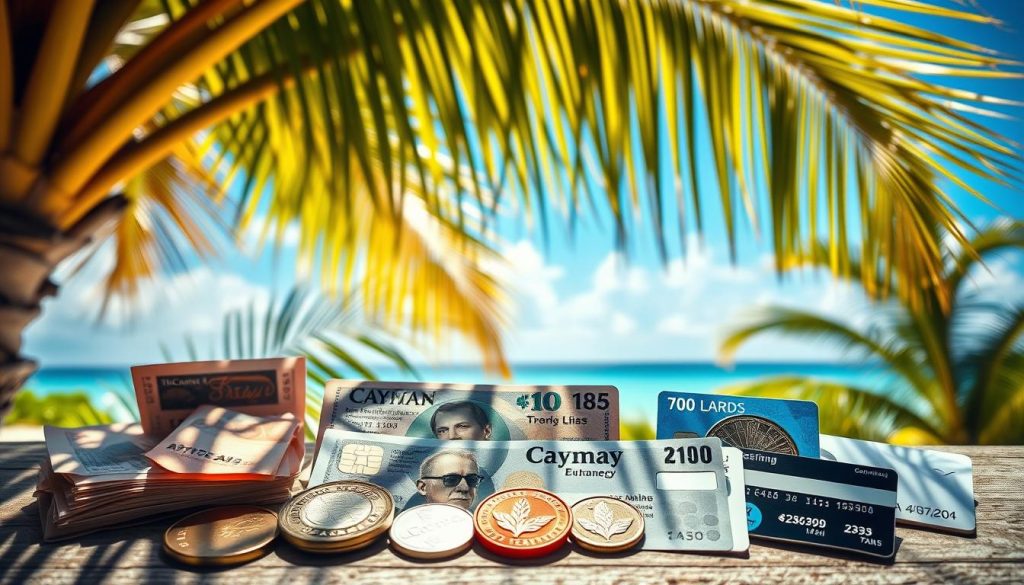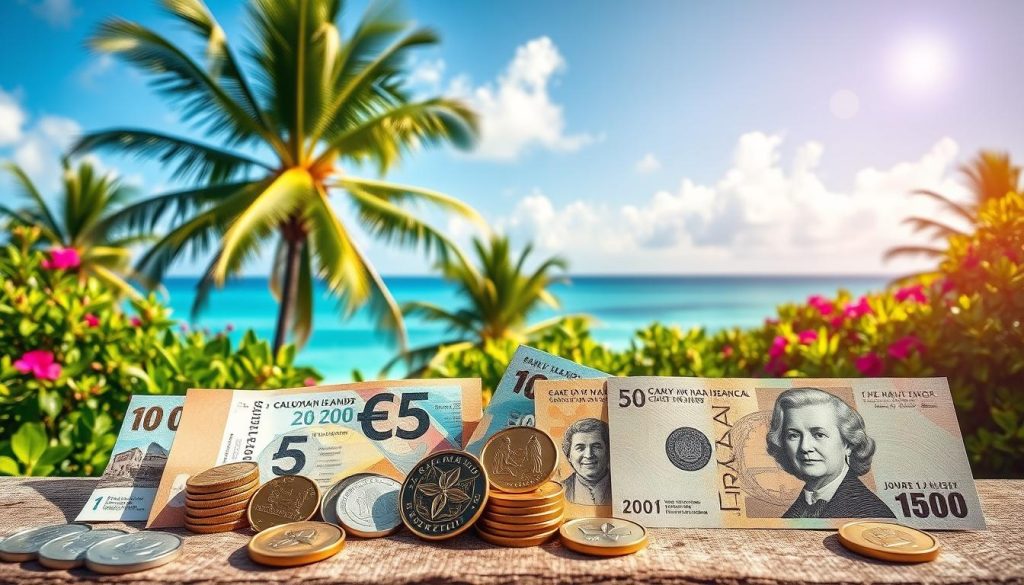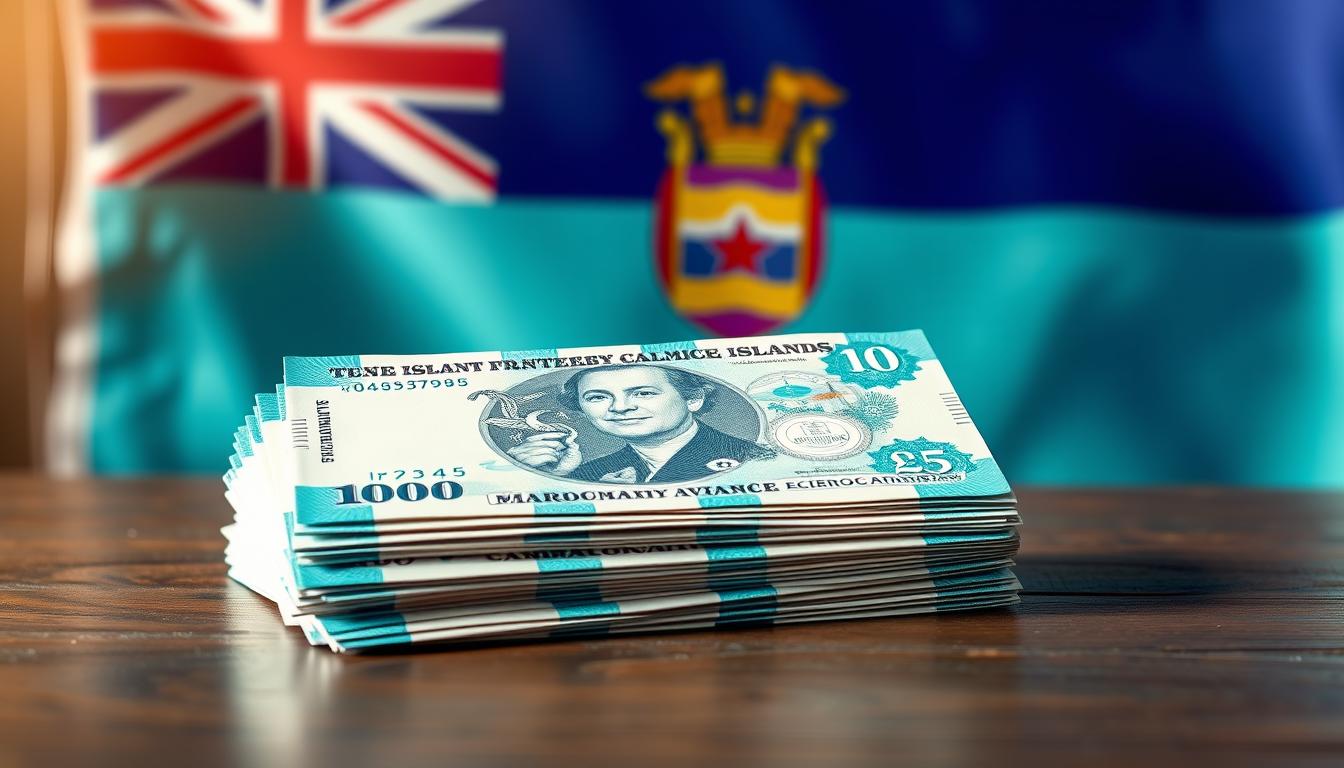✓ Accommodations✓ Flights✓ Rental Cars✓ Tours & Activities
Did you know that travelers often lose up to 10% of their budget due to poor currency exchange practices? Managing your money wisely can make or break your trip. This guide will help you navigate the financial aspects of your journey with ease.
The official currency here is the Cayman Islands Dollar. Knowing the exchange rate, especially the mid-market rate, is crucial. This ensures you get the best value for your money. Avoid unnecessary fees by planning your financial transactions ahead of time.
Using a travel card like Wise can save you from excessive charges. It’s a smart way to handle your expenses without worrying about hidden fees. This guide will also cover budgeting tips and payment methods to make your trip smooth and stress-free.
Stay tuned for practical advice on how to make the most of your travel budget. Whether it’s dining, activities, or accommodations, we’ve got you covered. Let’s ensure your trip is as enjoyable as it is affordable.
Understanding Cayman Islands Currency and Exchange Rates
Understanding exchange rates is key to maximizing your travel budget. The mid-market rate is the most accurate benchmark for currency trading. It’s the rate banks use when exchanging money between themselves, and it’s free of added fees.
Banks and currency services often use the mid-market rate as a reference. However, the rates you see at airports or hotels usually include extra charges. These fees can add up quickly, making it a less cost-effective way to exchange money.
Checking exchange rates online before your trip is a smart move. This helps you identify the best time to exchange your currency. It also ensures you’re not overpaying for transactions during your travel.
Mid-Market Rate Insights
The mid-market rate is the fairest way to compare currency values. It’s the midpoint between the buy and sell prices of a currency. Knowing this rate helps you avoid unnecessary fees and get the best value for your money.
Benefits of Exchanging Ahead
Exchanging money before your trip can save you from higher charges. Airport and hotel exchanges often have less favorable rates. Planning ahead ensures you’re prepared and can focus on enjoying your journey.
Understanding exchange rates also enhances your budget planning. It allows you to allocate funds more effectively and avoid surprises. This way, you can make the most of your travel experience without financial stress.
Optimal Payment Methods in Cayman Islands
Choosing the right payment methods can make your travel experience smoother and more cost-effective. Whether you’re dining out, shopping, or exploring, having the right tools ensures you stay within your budget.

Cards are widely accepted, but carrying cash is still essential for smaller transactions. Let’s explore the best options to manage your expenses efficiently.
Using Debit or Credit Cards
Debit and credit cards are convenient for most purchases. They’re widely accepted and offer security features like fraud protection. However, foreign transaction fees can add up, so it’s important to check your card’s terms.
Some cards offer perks like cashback or travel rewards, making them a great option for your trip. Always notify your bank before traveling to avoid any issues with international transactions.
Advantages of Travel Cards
Travel cards, like the Wise Multi-Currency Card, are designed for international use. They offer lower fees and transparent conversion rates, ensuring you get the best value for your money.
These cards support multiple currencies, making them ideal for frequent travelers. They also provide real-time exchange rate updates, so you always know how much you’re spending.
| Payment Method | Pros | Cons |
|---|---|---|
| Debit Card | Widely accepted, secure | Foreign transaction fees |
| Credit Card | Rewards, fraud protection | High-interest rates |
| Travel Card | Low fees, multi-currency support | Limited acceptance in some areas |
For a seamless experience, consider using a combination of payment methods. This ensures you’re prepared for any situation, whether it’s a small purchase or a larger expense.
Using a Travel Debit Card for Seamless Transactions
A travel debit card can simplify your financial transactions abroad. It’s a secure and cost-effective way to manage your money while traveling. With low fees and transparent rates, you can avoid unnecessary charges and focus on enjoying your trip.
Low Fees and Transparent Rates
One of the biggest advantages of a travel debit card is its low fees. Unlike traditional credit cards, which often charge foreign transaction fees, travel cards like the Wise Multi-Currency Card offer competitive rates. You’ll also benefit from real-time conversion rates, ensuring you always know how much you’re spending.
Planning your financial exchanges in advance can save you money. By using a travel card, you avoid the high fees typically charged at airports or hotels. This makes it a smart choice for budget-conscious travelers.
How to Order Your Card
Ordering a travel debit card is simple and convenient. Most providers, like Wise, allow you to apply online in just a few minutes. Once approved, your card will be delivered to your address, usually within 7-14 days.
Many travel cards also come with mobile apps, making it easy to track your spending and manage your funds. This added convenience ensures you’re always in control of your finances, even while on the go.
By ordering your card in advance, you’ll have everything you need before your trip begins. This preparation ensures a stress-free travel experience, allowing you to focus on creating lasting memories.
Cayman Islands: Ultimate Travelers Guide to Currencies & Payments
Planning your finances wisely can transform your travel experience from stressful to seamless. The official currency here is the Cayman Islands Dollar (KYD), which is pegged to the US Dollar at a fixed rate. Knowing this helps you avoid confusion and ensures you get the best value for your money.

For tourists, handling money efficiently is key. Always carry some cash for smaller transactions, as not all vendors accept cards. Use cards for larger purchases, but be mindful of foreign transaction fees. A travel card like Wise can save you from unnecessary charges.
Here are some practical tips to keep in mind:
- Exchange money before your trip to avoid higher rates at airports or hotels.
- Monitor exchange rates to identify the best time to convert your currency.
- Notify your bank before traveling to prevent card issues abroad.
Budgeting is essential for a stress-free trip. Plan your daily expenses, including meals, activities, and transportation. A mid-range budget of $200-$300 per day is a good starting point for most travelers.
By following these guidelines, you can avoid unnecessary fees and scams. Stay updated with exchange rates and use the tools mentioned in this guide to manage your finances effectively. With the right preparation, you’ll enjoy your trip without worrying about money.
Comparing Currency Exchange Options On Arrival and Before Departure
Making informed decisions about currency exchange can save you time and money during your travels. Whether you exchange money before departure or on arrival, understanding the differences can help you get the best value. Let’s explore the pros and cons of each option.
City Center vs. Airport Exchanges
City center exchanges often offer better rates compared to airport locations. Airports and hotels typically charge higher fees due to convenience. For example, exchange fees at airports can range from 1% to 3%, while city centers may match or beat local bank rates.
If you’re traveling to a bustling place, like a major city, visiting a currency exchange office in the center can save you money. These locations are designed to cater to both locals and tourists, ensuring competitive rates and lower fees.
Pros and Cons of Exchanging in Advance
Exchanging money before your trip has its advantages. You avoid the stress of finding a reliable exchange place upon arrival. Additionally, you can monitor exchange rates and convert your currency when the rate is favorable.
However, exchanging in advance may not always be practical. If you’re unsure about your spending needs, you might end up with leftover currency. Some services, like CXI, allow you to sell back unused currency at a special rate, minimizing losses.
| Exchange Option | Pros | Cons |
|---|---|---|
| City Center | Better rates, lower fees | May require extra travel |
| Airport | Convenient, available 24/7 | Higher fees, less favorable rates |
| Before Departure | Stress-free, better rate control | Risk of leftover currency |
| On Arrival | Flexible, based on needs | Limited options, higher fees |
To make the most of your travel budget, consider combining exchange options. Use city center exchanges for bulk conversions and keep some cash for immediate needs. This guide ensures you’re prepared for any situation, whether you’re in a bustling city or a remote place.
By planning ahead and choosing the right exchange place, you can enjoy your trip without worrying about unnecessary fees. Remember, the world of currency exchange is vast, but with the right knowledge, you can navigate it confidently.
Essential Tips for Exchanging Money Safely
Exchanging money safely is a crucial part of any travel plan. Knowing how to avoid extra fees and scams can save you both time and cash. Here are some practical tips to help you manage your finances wisely.
What is Dynamic Currency Conversion?
Dynamic currency conversion (DCC) is when a merchant offers to charge you in your home currency instead of the local one. While it might seem convenient, it often comes with higher fees and poor exchange rates. Always choose the local currency option to avoid unnecessary costs.
Here’s a quick comparison to help you understand the difference:
| Option | Pros | Cons |
|---|---|---|
| Local Currency | Lower fees, better rates | None |
| Home Currency (DCC) | Convenient | Higher fees, poor rates |
Spotting Hidden Fees
When paying with your card, always check for hidden fees. Some banks and merchants add extra charges for international transactions. One thing to remember is to ask about the total price before completing the payment.
“Always choose the local currency option to avoid unnecessary costs.”
Best Practices for Safe Exchanges
- Avoid exchanging money at the airport. Rates are often higher, and fees can add up quickly.
- Use ATMs from reputable banks. They usually offer better rates than currency exchange booths.
- Keep an eye on your surroundings when handling cash. Stay vigilant to prevent theft or scams.
It’s a good idea to plan ahead and research exchange rates before your trip. This ensures you get the best value for your money. By following these tips, you can exchange money safely and focus on enjoying your journey.
Diverse Payment Methods: Cash, Card, and Prepaid Options
Managing your money effectively while traveling can make your trip smoother and more enjoyable. In the Cayman Islands, diversifying your payment methods ensures flexibility and security. Whether you’re exploring the city or relaxing on the beach, having the right tools helps you stay within budget.
Combining Payment Options Effectively
Using a mix of cash, cards, and prepaid options is a smart strategy. Cash is ideal for small purchases, like snacks or tips, while cards are perfect for larger expenses. Travel cards, like Wise or Revolut, offer low fees and real-time exchange rates, making them a great choice for international transactions.
Here’s how to combine them:
- Carry a small amount of cash for immediate needs.
- Use a travel card for most purchases to avoid foreign transaction fees.
- Keep a credit card as a backup for emergencies.
Minimizing Additional Fees and Charges
Extra fees can quickly add up, but you can avoid them with a few simple steps. First, use a travel card that offers fee-free ATM withdrawals. For example, Wise allows up to £200 in fee-free withdrawals per month. Second, monitor exchange rates on your phone to ensure you’re getting the best deal.
Here’s a comparison of common fees:
| Payment Method | Fees |
|---|---|
| Debit Card | Foreign transaction fees |
| Credit Card | High-interest rates |
| Travel Card | Low fees, fee-free withdrawals |
Using a mobile app to track your spending can also help you stay on budget. Apps like Wise or Revolut provide real-time updates, so you always know how much you’re spending. This is especially useful when exploring a new city or visiting popular tourist sites.
By combining payment methods and minimizing fees, you can enjoy your trip without financial stress. Plan ahead, use the right tools, and focus on making unforgettable memories.
Planning Your Budget: Managing Currency in Cayman Islands
Planning your daily budget is essential for a stress-free trip to the Cayman Islands. Knowing how much to spend on accommodation, meals, transportation, and entertainment helps you stay on track. With the official currency cayman being the Cayman Islands Dollar (KYD), it’s important to manage your cash and cards wisely.

Estimating Daily Expenses
Your daily budget will depend on your travel style. For a budget trip, expect to spend around CI$75-100 (approximately £62-83) per day. This covers basic accommodation, meals at local eateries, and public transportation. Mid-range travelers should budget CI$150-250 (about £125-208) daily, which includes nicer hotels, dining at mid-tier restaurants, and some activities.
For a luxury experience, plan to spend over CI$300 (more than £249) per day. This includes high-end resorts, fine dining, and private tours. Always account for additional fees like tips, which are typically 15-20% in restaurants.
Leveraging Exchange Rates
To get the best value for your money, monitor exchange rates before your trip. The currency cayman is pegged to the US Dollar, so rates remain stable. Use a travel card like Wise to avoid high fees and access real-time exchange rates. This ensures you’re not overpaying for transactions.
Practical Budgeting Tips
- Carry a mix of cash and cards. Use cash for small purchases and cards for larger expenses.
- Notify your bank before traveling to avoid card issues abroad.
- Track your spending using a mobile app to stay within budget.
| Expense | Budget (CI$) | Mid-Range (CI$) | Luxury (CI$) |
|---|---|---|---|
| Accommodation | 50-75 | 100-150 | 200+ |
| Meals | 15-25 | 30-50 | 75+ |
| Transportation | 10-15 | 20-30 | 50+ |
| Activities | 10-20 | 30-50 | 75+ |
By planning ahead and using the right tools, you can enjoy your trip without worrying about fees or overspending. Stay informed about the official currency cayman and manage your cash wisely to make the most of your travel experience.
Smart Financial Decisions for Your Cayman Islands Trip
Making smart financial choices can enhance your travel experience and save you money. By avoiding common pitfalls and using the right tools, you can manage your budget effectively and focus on enjoying your trip.
Avoiding Transaction Pitfalls
When traveling, it’s easy to fall into traps like high ATM fees or unfavorable exchange rates. To avoid these, use ATMs from reputable banks in the area. These often offer better rates than airport or hotel options.
Always choose the local currency when paying with your card. Dynamic currency conversion (DCC) may seem convenient, but it often comes with hidden fees. Staying alert to these details can save you significant cost.
Strategies for Cost-Effective Spending
Using a travel card is one of the best ways to minimize fees. Cards like Wise or Revolut offer low transaction costs and real-time exchange rates. Pre-ordering your card ensures you’re prepared before your trip begins.
Here are some actionable tips:
- Exchange money in city centers for better rates compared to airports.
- Notify your bank before traveling to avoid card issues abroad.
- Track your spending using a mobile app to stay within budget.
By combining these strategies, you can enjoy your trip without worrying about unnecessary fees. Stay informed, use the right tools, and make the most of your travel experience.
Local Insights: Best Practices from Experienced Travelers
Learning from those who’ve been there can make your trip smoother and more enjoyable. Experienced travelers often share valuable tips that go beyond guidebooks. These insights can help you manage your money wisely and avoid common pitfalls.

On-the-Ground Advice
One of the best ways to handle your finances is to carry a mix of cash and cards. Many travelers recommend keeping small bills for tips and small purchases. For larger expenses, using a travel card can save you from high fees.
ATMs are widely available, but it’s wise to use those from reputable banks. These often offer better rates and lower fees. Always notify your bank before traveling to avoid issues with international transactions.
Real Traveler Feedback
Travelers often highlight the importance of planning ahead. Exchanging money before your trip can save you from unfavorable rates at airports or hotels. Monitoring exchange rates can also help you get the best value for your money.
Here’s what one traveler shared:
“Always choose the local currency when paying with your card. It saves you from hidden fees and ensures you’re not overpaying.”
Another tip is to research tipping etiquette. In many places, a 15-20% tip is standard for restaurants. Knowing these details can help you budget more effectively and avoid awkward situations.
| Advice | Benefit |
|---|---|
| Carry small bills | Convenient for tips and small purchases |
| Use reputable ATMs | Lower fees and better rates |
| Notify your bank | Avoid card issues abroad |
By following these tips, you can make the most of your day and enjoy a stress-free trip. Local insights and traveler feedback are invaluable resources for planning your experience. Use them to your advantage and focus on creating unforgettable memories.
Additional Considerations for Payment and Currency Management
Handling money efficiently while traveling requires careful planning and awareness of potential pitfalls. Beyond the basics, there are several factors to consider to ensure your financial transactions are smooth and cost-effective.
One often overlooked aspect is the importance of keeping receipts. Receipts help you track your spending and resolve any disputes with merchants or banks. They’re especially useful for larger transactions or when using a car rental service.
Hidden fees can quickly add up, so it’s crucial to review your bank statements regularly. Some banks charge extra for international transactions, while others may have fees for ATM withdrawals. Always check the fine print before making a purchase or withdrawing cash.
Alternative financial tools like payment apps can simplify your activity planning. Apps like Wise or Revolut offer real-time exchange rates and low fees, making them ideal for managing your budget. They also provide spending insights, helping you stay on track.
When engaging in varied activities, such as shopping or dining, consider using a mix of payment methods. Cash is handy for small purchases, while cards are better for larger expenses. This approach ensures you’re prepared for any spot or situation.
| Consideration | Tip |
|---|---|
| Hidden Fees | Review bank statements and check for international transaction fees. |
| Receipts | Keep receipts for all transactions to track spending and resolve disputes. |
| Payment Apps | Use apps like Wise or Revolut for low fees and real-time exchange rates. |
| Mixed Payments | Carry cash for small purchases and use cards for larger expenses. |
Staying informed about all financial aspects before and during your trip is essential. By planning ahead and using the right tools, you can avoid unnecessary fees and focus on enjoying your journey. Whether you’re exploring a new spot or renting a car, these tips will help you manage your money wisely.
Conclusion
Smart financial planning can make your trip stress-free and enjoyable. Understanding exchange rates and choosing the right payment methods are essential for managing your budget effectively. Using a travel app like Wise can help you avoid hidden fees and track your spending in real-time.
Carry a mix of cash and cards for flexibility. Notify your bank before traveling to prevent card issues. Planning ahead ensures you’re prepared for any situation, whether it’s dining out or exploring your destination.
By making informed financial decisions, you can enhance your overall travel experience. Use local resources and tools to stay on budget. With the right preparation, your trip will be smooth and cost-effective.
Ready to explore your next destination? Start planning today and make the most of your journey. A well-managed budget allows you to focus on creating unforgettable memories.
The above is subject to change.
Check back often to TRAVEL.COM for the latest travel tips and deals.






